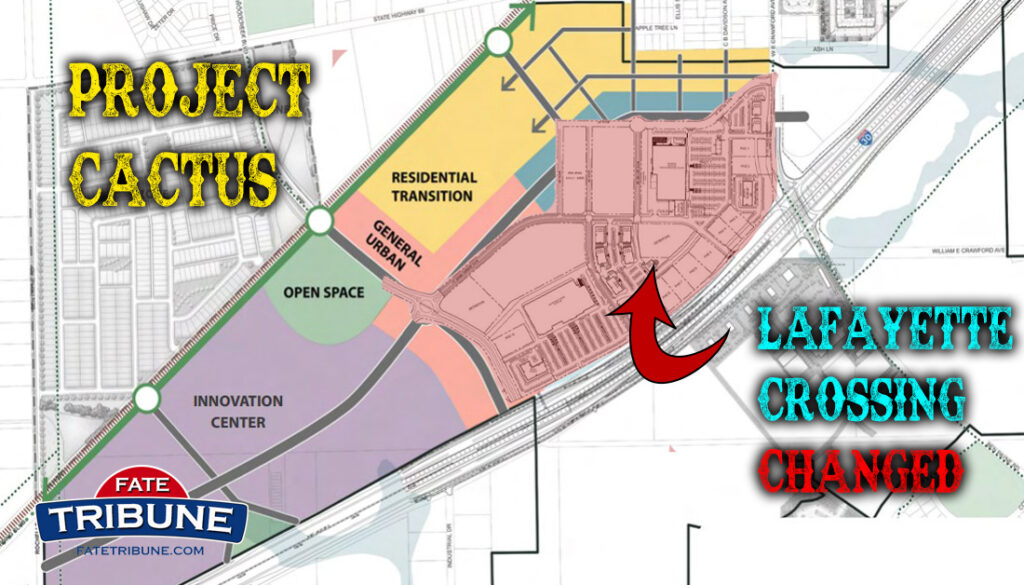Fate, TX – Fate Tribune
In a swift decision, the Fate City Council has approved a controversial modification to the Lafayette Crossing development agreement—now rebranded as “Project Cactus”—that authorizes up to $15 million in reimbursements to a private developer for public infrastructure. The move, framed by city officials as an urgent economic opportunity, was rushed through the council without adequate public notice, discussion, or debate.
Coincidentally, the council’s vote to give away up to $15 million of taxpayer-controlled funds came just weeks after the city issued a $20 million bond, $15 million of which will be used to construct a new police station. The Fate Tribune has submitted an Open Records Request (ORR) to discover if the city knew of this potential request by the developer before the bond proposal was issued to the voters.
Buried in the Agenda, Rushed Through Council
The Project Cactus agreement appeared on a recent council agenda under the vague language of “economic development negotiations; and to deliberate the offer of a financial or other incentive to the business prospect with no clear explanation of the project’s scope, cost, or long-term financial obligations.” The Agreement was presented to the Council in a closed, executive session, and the public was never able to review it. Only a summary, which does not indicate how many incentive credits were under consideration, was posted for the public. Therefore, the people of Fate were left without access to the details and had no meaningful opportunity to review, question, or weigh in on the proposal before the council cast its vote.
Council members were reportedly told that time was of the essence and that an immediate vote was necessary to secure the project. The pressure tactic left no room for thorough analysis or citizen engagement. The rushed timeline ensured that residents would not have a chance to digest the financial implications or voice either support or opposition.
This is not the first time Fate residents have expressed frustration with the city’s lack of transparency in major spending decisions, but the size and scope of this developer giveaway have taken concerns to a new level.
A Familiar Development, Rebranded with Bigger Costs
Project Cactus will span approximately 80 acres at the northwest corner of Interstate 30, between Woodcreek Blvd. and FM-551. Plans include 400,000 square feet of retail and restaurant space, anchored by two Fortune 100 retailers, we are told: one a grocery store, the other a department store. Both of which are undisclosed to the public.
In order to serve the development, approximately $15 million worth of public infrastructure—roads, sewer, water, and utilities—must be constructed. Under the newly amended agreement, the city will reimburse the developer for those costs using a blend of revenue streams:
- $9 million in developer-paid impact fees collected from the eastern portion of the project
- $1 million in utility capital replacement funds, earmarked for maintaining the city’s existing infrastructure
- $1.7 million from the Fate Economic Development Corporation’s sales tax revenues
- $3.3 million from the City’s general fund, supported by residential property taxes and citywide sales taxes
Although the agreement is framed as “performance-based,” reimbursement begins in 2028 and continues through 2037, with payments tied to 50% of the city’s potential sales tax generated from retailers in the development. The money comes as “tax credits”, a type of transferrable commodity that can be sold or traded in private markets. What we are referring to as the “developer”, is actually a slew of companies: D-F FUND 18, LTD., D-F FUND VI, LTD., D-F SOUTHWEST FUND 19, LTD., and LA-DF INVESTMENT FUND 8. These Tax Credits can be used by anyone on the development team, or sold off to some future entity. They can also just be cashed in, giving the developers a nice bonus.
$15 Million for Retail, $15 Million for Police—But Only One Got Voter Input
What makes this maneuver troubling to residents is the striking contrast between how the city handled its $15 million police station project versus how it handed over $15 million to a developer.
The police station project was part of a broader $20 million public safety bond package presented to voters and approved in November 2024. It went through a process of public discussions, public meetings, and was ultimately subject to democratic approval by a vote of the people, where it was passed by 60% of the voters.
In contrast, the Project Cactus reimbursement—also worth $15 million—received no such scrutiny. There were no town halls, no financial impact analysis made public, and no citizen advisory input. It was quietly placed on the agenda and passed under the rationale of urgency. Other than what was presented seconds before the vote, the public had no idea what, “Project Cactus” was.
A Taxpayer Gamble on Retail Hopes
Supporters of the deal argue the project will eventually generate over $140 million in taxable property value and $2.8 million in annual sales tax revenue for the city. But those gains are 10 years from now and are far from guaranteed. The commercial retail sector has been highly volatile in recent years, and the success of any development on the outskirts of Dallas-Fort Worth depends heavily on consumer patterns, traffic flow, and macroeconomic factors outside the city’s control.
With infrastructure costs scheduled to be completed by mid-2027 and anchor stores set to open by that year’s end, the sales tax reimbursement clock begins in 2028 and runs through 2037. The agreement replaces the original Lafayette Crossing deal, which capped developer credits at $9 million and limited city exposure. However, as we stated previously, the Tax Credits can be used or transferred at the whim of the Developers.
Citizens Left Wondering: Who Does City Hall Work For?
For many residents, the larger concern isn’t the project itself—it’s the process.
A massive, multimillion-dollar commitment was pushed through with minimal transparency, no time for public input, and under pressure to act quickly. In doing so, the city council placed the interests of a private developer ahead of the taxpayers who fund the very infrastructure being gifted away.
While the council insists that Project Cactus will broaden the tax base and relieve residential property owners in the long term, it’s the short-term sleight-of-hand that’s raising alarm bells. When the public is kept in the dark until it’s too late to act, it’s not economic development—it’s taxation without representation.
The people of Fate approved a bond to build a police station. They were never given a chance to weigh in on giving away the same amount to a retail developer. Perhaps it’s time to revise the Town Charter so that future councils can’t give away more than $100,000 to a developer at a time, without voter approval. It’s clear that the Fate Municipal Development District doesn’t view city obligations in the same way that citizens do. Furthermore, City Manager Michael Kovacs was derelict in his duty to the citizens of Fate, choosing to prioritize a developer’s timeline over the public’s right to transparency, oversight, and meaningful participation in the decision-making process.
Now the money is committed, the votes are cast, and the deal is done. What remains to be seen is whether the gamble pays off—or whether Fate’s taxpayers will be left holding the bag.

